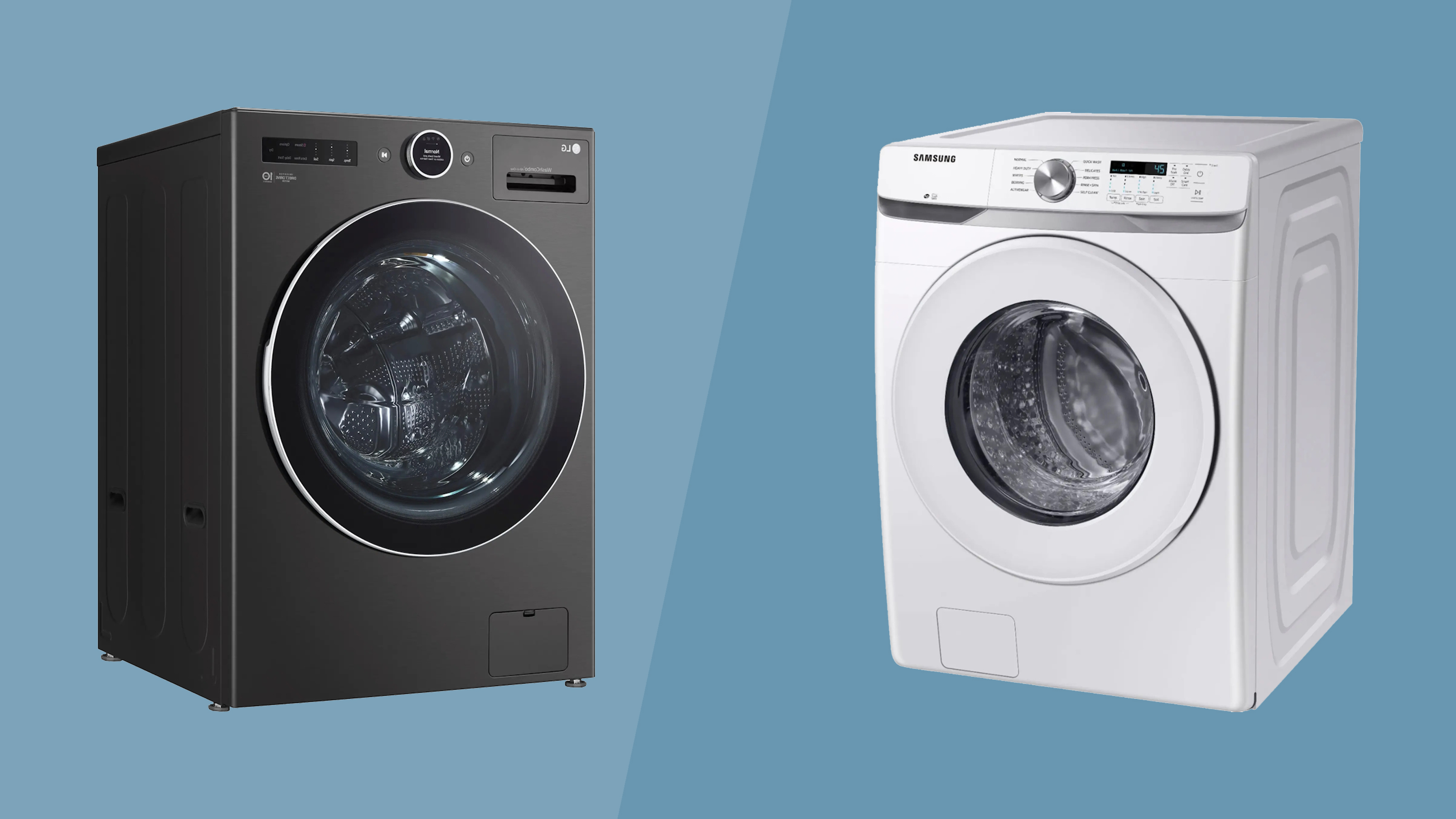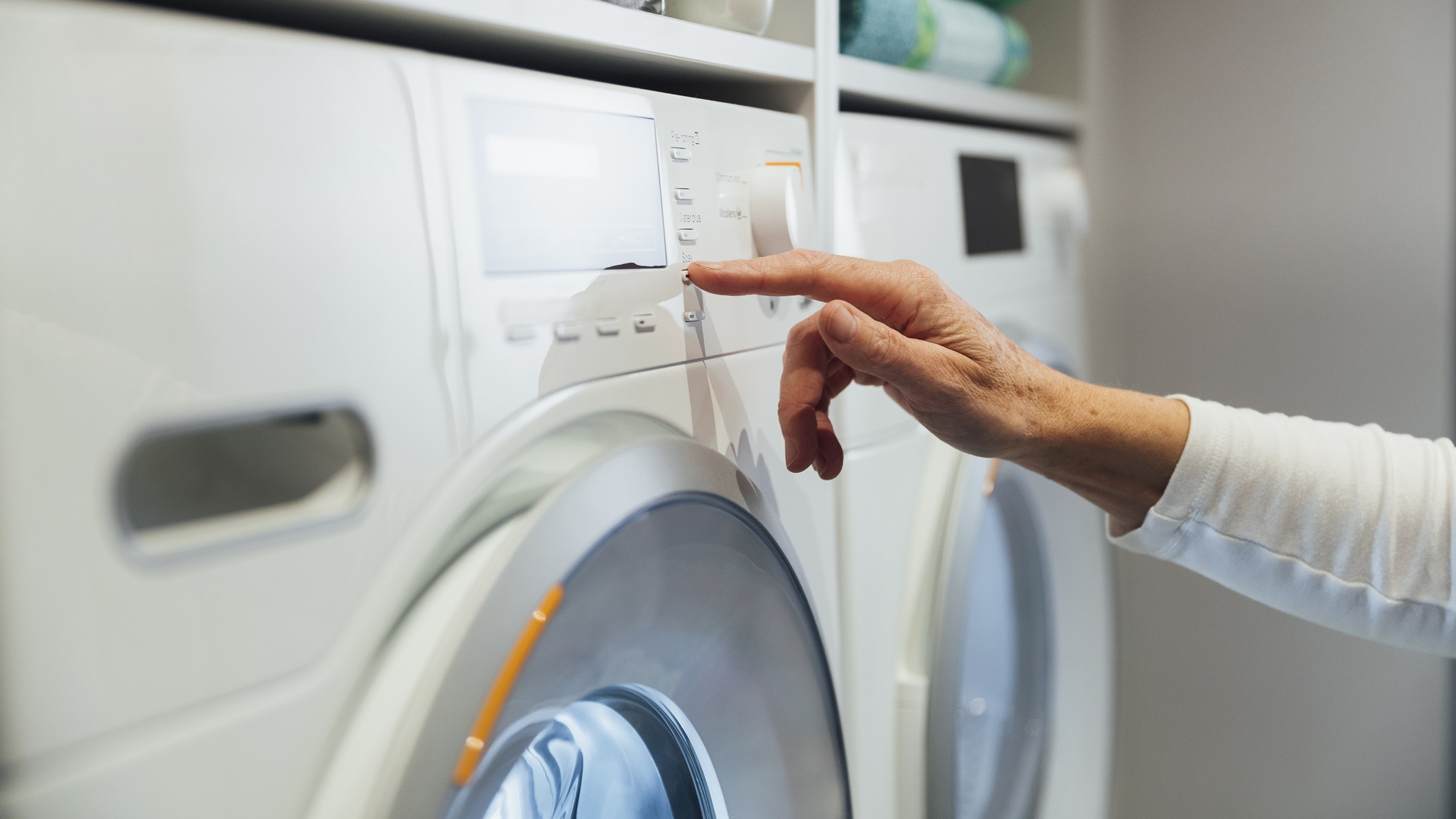LG washing machine vs Samsung: which is right for you?
Which brand of washing machine is the right fit for your needs and budget?

When choosing the best washing machine for your household, LG and Samsung are two prominent brands to consider. Both are at the forefront of advanced washing machine design and Smart technology, but which one is better for your budget and needs?
Philip Twigg, a content writer at Reliant with over 60 years of experience in appliances, says, “LG and Samsung washing machines are packed full of unique technologies that can improve the results of your average wash. They’re equipped with powerful drivers, smart sensors, and unique cycles that put them well ahead of the competition.”
As Twigg points out, both LG and Samsung have built solid reputations in the home appliance market and are known for their cutting-edge technology and reliability. This means there isn't a clear-cut winner between the two. Each offers outstanding washing machines, with a wide selection of models at various price points.
You will have a preference based on your specific needs and budget. My guide is here to help you navigate the similarities and differences between the two brands so you can decide independently on a washing machine you'll love.

LG washing machine vs Samsung: Price and value
It's possible to pick up a basic LG or Samsung washer relatively cheaply. For example, Best Buy features Samsung washers that start at just $579.99 for a 4.5 cu. ft. top-load washer with vibration reduction technology.
LG's cheapest washer on the same site is also a top-load washer, available for $499.99. It has 4.1 cu ft. and a powerful water flow with LG's TurboDrum technology.
LG models in the mid-range price category usually offer excellent value, with features like the TurboWash technology and Steam+ functionality. Their mid-range options include smart features like the LG ThinQ app for remote control and troubleshooting. Take, for example, this 4.5 cu ft graphite washer for $899.99, featuring all of the above, cold wash technology, and built-in sensors that detect fabric types and load size.
Sign up to receive the latest news, reviews, buying guides and deals direct to your inbox
Samsung also offers competitive pricing in the mid-range, with models that feature the Ecobubble cycle and AddWash technology, which adds convenience and energy efficiency. Their mid-range machines often include smart technology, allowing connectivity to the SmartThings app for remote management.
A good example of Samsung's top-range offering is the 5.3 cu. ft. stackable washer for $1099.99. This washer utilizes all the Smart tech Samsung offers, including AI OptiWash, which takes the guesswork out of cycle selection by automatically detecting what’s in the load and how dirty clothes are. AI Smart Dial simplifies your washer’s controls by learning and recommending cycles and allowing you to customize your cycle list, making laundry day a breeze. It also comes in a range of premium colors.
While it's possible to get some Smart features in LG's mid-price range, spending a little (or a lot) extra can get you access to more advanced AI features, such as LG’s AI Direct Drive (AI DD)—a smart technology in their front-load washing machines that uses AI to choose the best wash cycle for your clothes. It analyzes each load's weight, softness, and fabric type and then automatically selects the ideal wash motions, temperature, and cycle time for optimal cleaning.
LG's 5.0 cu. ft. Mega Capacity Smart Front Load Washer with AI DD® 2.0 Built-In Intelligence & TurboWash® 360° is a prime example of everything LG can provide and is priced at $1099.99.
According to Twigg, Samsung washing machines have a slight advantage in energy-efficient washing. It's due to their innovative Ecobubble cycle.
"The Ecobubble cycle is specially designed to deliver more effective cleaning while saving you extra money," says Twigg. "Ecobubbles force themselves between stains and the fibers of your clothes for truly effective stain removal. This feature is also incredibly efficient because it only uses low-temperature water, so it’s great for saving you money."
Both brands provide comparable warranties - typically one year for parts and labor -and options for extended coverage on specific components. LG and Samsung machines maintain similar pricing for repairs due to their shared use of common parts and technologies, so ongoing costs are likely to be similar, too.

As head content writer at Reliant, a UK-based company with over 60 years of experience with appliances and consumer electronics, Philip has been able to get to grips with the best of modern electronics.

LG washing machine vs Samsung: Features and functions
Both brands boast a range of advanced laundry technologies, from AI-empowered washing cycle controls to energy-efficient cleaning.
“LG's TurboWash 360 makes its washing machines perfect for those with busy schedules,” Twigg notes. Its Steam+ technology also releases steam to soften fabrics before washing and prevent wrinkles afterward. Twigg suggests, “LG washing machines stand out if you’re looking to cut down on time spent ironing,” thanks to these steam features.
Meanwhile, Samsung offers the Ecobubble cycle, which generates a soft foam that effectively lifts dirt and allergens from fabrics, all while using lower-temperature water for cost savings. Other notable features include its AddWash technology, which means you can pop that forgotten sock in mid-cycle and be reassured that it'll be as clean as the rest of your laundry load.
According to Twigg, here are more Samsung features and functions worth considering:
- SmartThings: Many top Samsung washing machines are WiFi-enabled, allowing you to connect them to the Samsung SmartThings app. This app lets you remotely control the appliance and monitor its energy consumption and overall health.
- Quick Drive: Samsung washing machines with a unique QuickDrive can handle immense laundry loads faster than a standard washing machine. The drum uses a pulsator to agitate fabrics to loosen dirt and stains more efficiently.
- AI Wash: Not sure which cycle is best for your laundry? Let AI Wash technology handle the guesswork. Small sensors inside the drum detect the weight of your laundry and even how dirty it is, creating the perfect cycle to get the job done.
- Auto Dose: Save money on wasted detergents with Auto Dose technology, which ensures the unit only uses exactly the amount of detergent it needs to get the job done!
LG also has some nifty features that are worth shelling out for, says Twigg:
- LG ThinQ AI: LG washing machines are WiFi compatible, so you can easily connect them to the LG ThinQ AI app, from which you can control them entirely remotely. The app can also troubleshoot operational errors. LG ThinQ AI is also compatible with voice assistants like Amazon Alexa for hands-free control.
- AI DD: Many LG washing machines are equipped with special AI Direct Drives, packed full of sensors that can detect the weight of your laundry and how much wash you need. This allows the drum to take better care of your fabrics while saving you money on utility bills.
- ezDispense: The dispenser drawer is equipped with ezDispense technology. It analyses the needs of your laundry to determine exactly how much detergent is necessary for the job. It’s perfect for saving money otherwise wasted on excessive detergent use.

LG washing machine vs Samsung: Performance
In 2023, Consumer Reports named LG the most reliable brand for home appliances, giving it top marks in four key areas: washing machines, dryers, cooktops, and over-the-range microwaves.
In the J.D. Power 2023 U.S. Appliance Satisfaction Study, Samsung ranked highest for front and top-load washers, with LG following closely behind in the top-load category.
LG and Samsung washing machines perform very well and get high ratings from users; for example, both have dozens of 4-star and 5-star reviews on Best Buy, with LG just edging it on numbers.
Happy customers love LG's quiet operation and strong cleaning power, while Samsung stands out for its efficiency and advanced washing features. Users say both brands can easily handle anything, from delicate items to heavy-duty loads.
Regarding reliability, LG machines tend to have fewer reported issues over time, and many users find them consistently dependable. Samsung machines are also reliable, though some feedback mentions long-term durability. Overall, LG may have a slight advantage in terms of reliability based on customer satisfaction, but it's hard to call.
LG washing machine vs Samsung: Which is best?
LG and Samsung both offer excellent washing machines, each with unique strengths. Samsung shines in energy efficiency with its Ecobubble cycle, using foam to clean thoroughly at low temperatures. Many Samsung models also have SmartThings connectivity, allowing remote control and monitoring. Its AddWash feature is a handy bonus for adding items mid-cycle.
LG, known for reliability, offers powerful cleaning and a slight edge in customer satisfaction. Its TurboWash 360 cycle is ideal for quick, efficient washes, and the Steam+ feature softens fabrics while reducing wrinkles. The LG ThinQ app enables remote control and troubleshooting.
Reviews
Whirlpool 24" Stainless Steel AI Dishwasher Review
Napoleon TravelQ PRO285 Portable Gas Grill review
Dreame L40 Ultra Robot Vacuum Cleaner and Mop review: almost hands-free cleaning
GE Profile Smart Mixer with Auto Sense review: a powerful, thorough mixer
Echo eForce DPB-2500 review: a leaf blower as a snow removal tool?
DPAS-2100 + Pro Paddle Attachment review: a new way to remove snow this winter?
Midea MAD53109APK 5.5QT Air Fryer review: a small, simple, and highly effective option
Eureka J15 Pro Ultra Robot Vacuum review: hands-free cleaning for busy families
With Samsung excelling in energy-saving features and LG in fast, wrinkle-free washes, you may be nudged based on what's important to you.
LG washing machine vs Samsung: What the Experts Say
Twigg emphasizes the innovative technologies in both Samsung and LG washing machines, which can enhance your laundry routine.
For instance, Twigg says Samsung’s Ecobubble cycle creates a soft foam that works wonders by penetrating fabrics to lift dirt and allergens, all while using cooler water for better energy efficiency. Plus, many Samsung models are WiFi-enabled, so you can connect to the SmartThings app to control your washer from anywhere and monitor its performance.
Twigg says if you ever forget to toss in a sock, the AddWash feature lets you pop it in mid-cycle, and the QuickDrive technology speeds up washing by agitating your clothes more effectively.
Conversely, Twigg highlights LG washing machines for their TurboWash 360 cycle, which gets your laundry done in just 39 minutes—perfect for hectic days, especially if you have kids who forget to let you know their sports gear needs washing.
Twigg says LG's Steam+ technology is a game-changer, too, as it softens your fabrics and releases steam during and after the wash to help reduce wrinkles and creases. And if you love smart technology, he recommends LG's ThinQ AI app, which lets you easily control your washer remotely and troubleshoot any issues.
Both brands come equipped with smart sensors that adjust washing based on the weight and type of fabric, ensuring you get the best clean every time. As Twigg puts it, both Samsung and LG are leading the way in providing cutting-edge features that make laundry day much easier and more efficient.
LG washing machine vs Samsung: FAQs
Which brand is more energy-efficient?
Regarding energy efficiency, both LG and Samsung have made great advances in energy-saving technology. However, Samsung has a slight edge with its Ecobubble function, specifically designed to reduce energy use while delivering a thorough clean.
Ecobubble mixes water, detergent, and air to create soft foam penetrating fabrics more effectively, allowing the machine to clean efficiently at lower temperatures. This helps save energy costs and reduces wear on fabrics from hot water, making Samsung’s models a great choice for those looking to balance performance with energy savings.
LG, too, has energy-efficient options with features like AI-driven cycles that optimize water and energy use based on load size. Still, Samsung’s Ecobubble technology stands out among energy-conscious users.
Should I match my washing machine brand to my dryer brand?
There's no reason you should; it all comes down to your brand preferences, drying needs, and household budget. You can save a lot of money by shopping for a dryer that doesn't match your washer. If you have a smaller space or a large household, you may need to reduce or maximize capacity according to your needs, so it doesn't make sense to aim for similarly sized washers and dryers.
Opting for a dryer from the same range as your washer, or vice versa, can provide some benefits, especially if you purchase a set together at once.
Choosing a matching washer and dryer set gives your laundry room a neat, put-together look. The matching finishes and control panels make everything feel well-coordinated—especially if the appliances are visible in your home. Beyond aesthetics, matching sets are also designed to work in sync, meaning the washer’s spin speed is just right for the dryer’s drying power. This can help reduce drying time, saving energy and wear on your clothes.
Matched sets are also often simpler to install since they come in similar sizes and shapes, making side-by-side or stacked setups easier. Buying a set can sometimes qualify you for special promotions or extended warranties, which could lower upfront costs and reduce maintenance costs over time.

Joanne Lewsley is a reputable freelance writer specializing in evidence-based health and lifestyle content. With a background in journalism and extensive experience working for known brands, Joanne rigorously tests and evaluates home gadgets. Her passion for writing is complemented by her love for the outdoors and live music.
